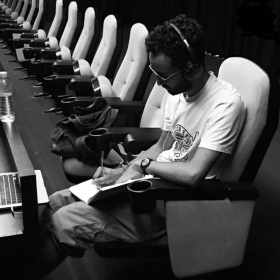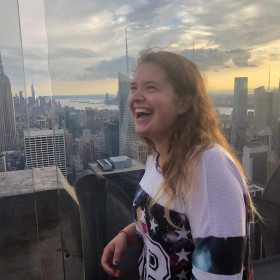Every so often an article comes out telling us how good reading is for our mental health. Bustle shows how it can reduce stress levels by 68% and help you sleep better, while The New Yorker explores 'bibliotherapy'. More recently, the concept has been taken a step further and the organisation Reading Well has developed 'Books on Prescription' - using reading as therapy.
Books from the scheme can be recommended by GPs, counsellors, and school nurses and are available in local libraries. The books are typically self-help guides, however, for young people, the range includes a handful of fiction books too, with big titles like The Curious Incident of the Dog in the Night Time and The Perks of Being a Wallflower.
This seems like a great idea – reading is good for us so why not channel this in useful ways? Unfortunately, it isn't that simple – literature, like all art, is incredibly subjective. In an interview with Professor Jonathan Bate on the concept of reading as therapy Stephen Fry, who has bi-polar disorder, had interesting take on the issue:
"I wish I could say that I have a list of poems or poets who are good for depression, or good for mania…. I don't think it quite works like that. I think one can be tremendously solaced or comforted by a poem, that's just charming and sweet about nothing too terrible. Or one can be incredibly depressed by such a poem."
He went on to argue that it is such a personal experience that "it would be an act of betrayal and dishonesty to suggest that there were poems that work." In talking to others about what reading means to them, I was able to corroborate this, as while one friend said "Reading soothes me, calms me, helps me at times to make decisions," another told me "I don't read when I'm stressed though because it's like my brain is too loud for me to focus on it."
On a more extreme note I also know the different effects it can have from personal experience; I am an avid reader and read to relax daily, however I have had negative experiences of reading. During a particularly stressful period one book inspired pretty terrifying nightmares, while during a period of depression I barely managed to pick up a book at all.
Negative experiences could be much more serious - a plot device could trigger someone suffering from PTSD, or some themes might be difficult for someone suffering from depression or eating disorders for example. But how do we know what is the wrong book and when? I read The Bell Jar at 17 and at the time I was happy and excited by the future, but I found the book devastating and cried for days. While I was upset, another person might instead find The Bell Jar helpful.
This raises the question of whether we should put trigger warnings on books. It is a widely-debated and incredibly controversial topic, but the bottom line comes down to practicality – we simply can't cover everything that might cause an adverse reaction. Equally, who would get to decide what is and isn't appropriate? While some books clearly aren't appropriate for some people, whether due to age or subject matter, it would cut too close to censorship if doctors, librarians, teachers, publishers or even MPs started controlling who can read what, even if it was in small ways.
However, there is no denying the positive effects of reading for many people. When I asked around, several people described how it helps them - with one friend claiming "no matter how low my mood gets, or how stressed I am, I know that picking up a book will instantly improve my mood…It calms me and helps clear my head." Another explained the aspects that we don't immediately think of: "reading is ritualistic, I get a coffee, sit in the same chair – the comforting routine instantly calms me. I guess it's like reading bedtime stories to children – my brain recognises the routine and tells my body to relax."
So, with clear benefits to reading for well-being, how do we overcome the potential problems? Simply encouraging people to read is a good start, and if young people pick up a book from this scheme and find comfort in it, or enjoy it so much that they want to find other books, then that can only be a good thing.
You can read more information on the Books on Prescription scheme on the Reading Well website.













Personally, I think reading is such a good way to relax, but obviously it depends on what you're reading. I don't think reading a heavy book like Lés Miserables is going to help with a lot...